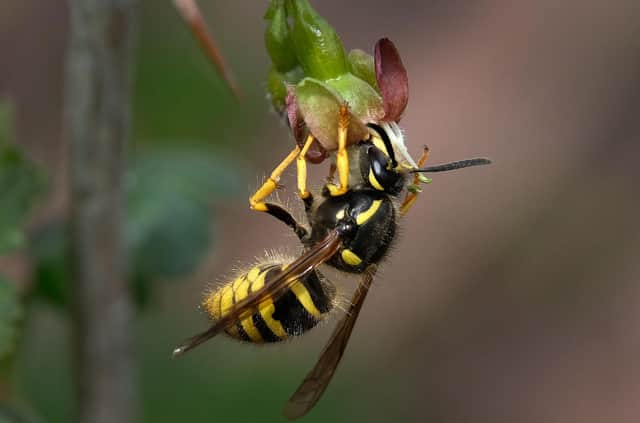The science behind allergic reactions to wasp stings became all too real for me – Professor Eleanor Riley


I looked down to see a drowsy and slightly bedraggled wasp heading for the shelter of the geraniums.
Within seconds, my heart rate shot up and I felt slightly dizzy. Over the next hour, first my toes and then the top of my foot turned red, got very hot and started to swell, and then the throbbing pain set in.
Advertisement
Hide AdAdvertisement
Hide AdTwo days later the pain was gone but the swelling extended above my ankle, the skin stretched tight as an overstuffed sausage; walking more than a few steps was impossible.
Ice packs, antihistamines and painkillers made very little difference; I just had to wait it out. A week later, the swelling, redness and heat have just about gone but it is maddeningly itchy.
Despite appearances, I got off rather lightly. I experienced what is termed a “large local reaction” – swelling and reddening, up to 15cm or more around the site of the sting, peaking at 48 to 72 hours and lasting for up to a week.
My initial response (racing heart, dizziness) was a simple “fight or flight” response – a surge of adrenaline to prepare my body in case some immediate action was required. That lasted mere moments.
Wasp venom, however, contains vasoactive peptides: small molecules that cause local blood vessels to dilate and become leaky, allowing more blood to flow into the site (hence the redness and heat) and plasma to leak out into the surrounding tissue (hence the swelling).
Swelling disturbs nerve endings, causing pain and itching. Venom components also cause the release of histamine from specialist cells called mast cells.
Histamine itself can cause blood vessels to become leaky and thus exacerbate the swelling; it is also a major cause of itching after insect bites and stings.
The size of the reaction may depend on how much venom is injected and how far it spreads, but some people also mount a “delayed hypersensitivity” reaction in which venom-specific T cells migrate into the site and secrete inflammatory molecules that potentiate the swelling and redness.
Advertisement
Hide AdAdvertisement
Hide AdThis would explain why the reaction continues to get worse for two to three days before starting to resolve. It may also explain why people who experience large local reactions once are likely to experience them again: the T cells remember.
Fortunately, I seem not to be acutely allergic to wasp stings. Wasp and bee allergies, caused by particular antibodies (IgE) that recognise specific components (antigens) of the venom, are characterised by rapid onset – within minutes – of a rash, swelling of lips or eyelids, severe dizziness and fainting, nausea, stomach cramps and, in the worst cases, difficulty breathing.
After binding to the venom antigens, IgE activates more mast cells, amplifying their effects on blood vessels and spreading this effect throughout the body; this is anaphylaxis.
Whilst a swollen foot is uncomfortable, the same degree of swelling in your throat or leakiness in your lungs can lead to asphyxiation. That would have been more than a painful inconvenience; that would have been a medical emergency.
Eleanor Riley is professor of infectious disease immunology at the University of Edinburgh
A message from the Editor:
Thank you for reading this article. We're more reliant on your support than ever as the shift in consumer habits brought about by coronavirus impacts our advertisers.
If you haven't already, please consider supporting our trusted, fact-checked journalism by taking out a digital subscription.
Comments
Want to join the conversation? Please or to comment on this article.
